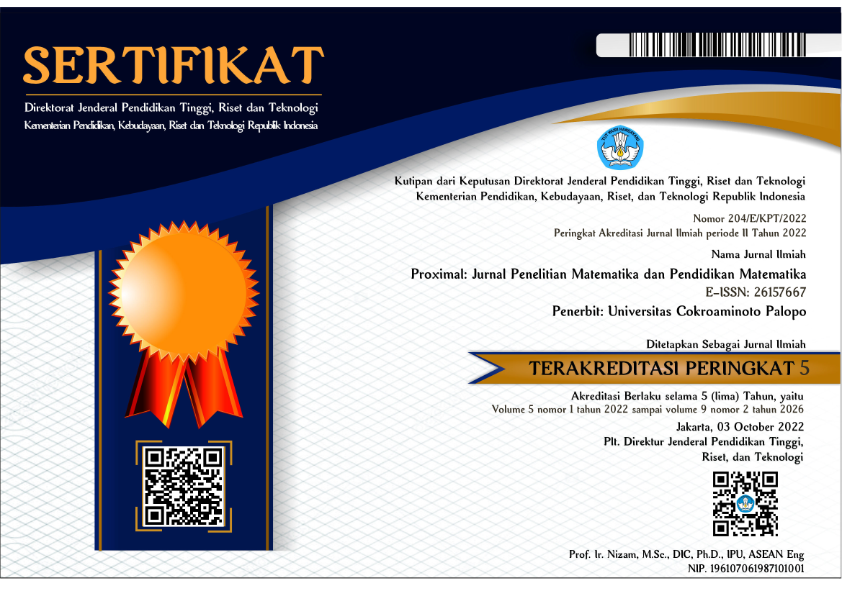PENGARUH MODEL KOOPERATIF TIPE TEAMS GAMES TOURNAMENTS TERHADAP KEMAMPUAN PEMECAHAN MASALAH MATEMATIKA DAN SELF EFFICACY SISWA
Keywords:
Teams Games Tournaments, Pemecahan Masalah, Self EfficacyAbstract
Penelitian ini adalah penelitian eksperimen yang melibatkan dua kelas. Penelitian ini bertujuan untuk mengetahui pengaruh model pembelajaran kooperatif tipe Teams Games Tournament (TGT) terhadap kemampuan pemecahan masalah matematik siswa kelas VIII SMP Negeri 4 Palopo, dengan kriteria pengaruh antara lain: (1) kemampuan pemecahan masalah matematika siswa setelah diterapkan model pembelajaran kooperatif tipe TGT, (2) self efficacy siswa setelah diterapkan model pembelajaran kooperatif tipe TGT, (3) kemampuan pemecahan masalah matematika siswa yang diajarkan dengan model pembelajaran kooperatif tipe TGT lebih baik daripada kemampuan pemecahan masalah matematis siswa yang diajarkan dengan pembelajaran konvensional, (4) self efficacy siswa yang diajarkan dengan model pembelajaran kooperatif tipe TGT lebih baik daripada self efficacy siswa yang diajarkan dengan pembelajaran konvensional. Berdasarkan hasil penelitian ditemukan bahwa (1) Kemampuan pemecahan masalah matematika siswa setelah diterapkan model pembelajaran kooperatif tipe TGT berada pada kategori tinggi, (2) Self efficacy siswa setelah diterapkan model pembelajaran kooperatif tipe TGT berada pada kategori baik, (3) Kemampuan pemecahan masalah matematika siswa yang diajarkan dengan model pembelajaran kooperatif tipe TGT lebih baik dari pada kemampuan pemecahan masalah matematika siswa yang diajarkan dengan pembelajaran konvensional, (4) Tidak terdapat perbedaan self efficacy siswa antara siswa yang diajar dengan menggunakan model pembelajaran kooperatif tipe TGT dan siswa yang diajar dengan pembelajaran konvensional. Berdasarkan kriteria pengaruh pembelajaran dapat disimpulkan bahwa model pembelajaran kooperatif tipe Teams Games Tournaments (TGT) berpengaruh terhadap kemampuan pemecahan masalah matematika siswa, tetapi secara signifikan tidak berpengaruh terhadap self efficacy siswa kelas VIII SMP Negeri 4 Palopo.
Downloads
References
Damayanti, S. dan Tohimin, M, A. 2017. Pengaruh Model Pembelajaran Tipe TGT (Teams Games Tournament) terhadap Hasil Belajar Matematika. JKPM (Jurnal Kajian Pendidikan Matematika). Vol. 02 No. 02. Hlm. 235-244.
Ibrahim. dan Hidayati, N. 2014. Pengaruh Model Pembelajaran Teams Games Tournament (TGT) terhadap Peningkatan Kemampuan Pemecahan Masalah Matematika di Tinjau Kemampuan Awal Siswa SMA Negeri 1 Seyegen. Jurnal Agri Sains. Vol. 4 No. 2. Hlm. 115-138.
Ilyas, M. 2015. Metodologi Penelitian Pendidikan Matematika. Bandung: Pustaka Ramadhan.
Jatisunda, M. G. 2017. Hubungan Self-Efficacy Siswa SMP dengan Kemampuan Pemecahan Masalah Matematika. Jurnal Theoremes (The Original Research Of Mathematics). Vol. 1 No. 2. Hlm. 24-30.
Putri, S, E. 2018. Efektivitas Model Pembelajaran Kooperatif Tipe Jigsaw terhadap Kemampuan Pemecahan Masalah Matematis Siswa dan Self Efficacy Siswa Kelas VII SMP Negeri 8 palopo. Skripsi Tidak di Terbitkan. Palopo. Pendidikan Matematika. Universitas Cokroaminoto Palopo.
Rianti, R. 2018. Profil Kemampuan Pemecahan Masalah Matematis Siswa SMP Pada Materi Bangun Ruang Sisi Datar. Jurnal Pendidikan Tambusai. Vol.2, No. 4. Hlm. 802-812. ISSN: 2614-3097
Sariningsih, R. dan Purwasih, R. 2017. Pembelajaran Problem Based Learning untuk Meningkatkan Kemampuan Pemecahan Masalah Matematis dan Self Efficacy Mahasiswa Calon Guru. JNPM (Jurnal Nasional Pendidikan Matematika. Vol. 1 No. 1. Hlm. 163-177.
Sumbung, H., Ma’rufi, & Salwah. 2019. Model Pembelajaran Kooperatif Tipe Student Team Achievement Division Untuk Meningkatkan Kemampuan Pemecahan Masalah Matematis Ditinjau Dari Genre. Proximal: Jurnal Penelitian Matematika dan Pendidikan Matematika Volume 2 Nomor 2, Hlm 27-38..
Novferma, N. 2016. Analisis Kesulitan dan Self Efficacy Siswa SMP dalam Pemecahan Masalah Matematika Berbentuk Soal Cerita. Jurnal Riset Pendidikan Matematika. Vol. 3 No. 1. Hlm. 76-87.
Downloads
Published
How to Cite
Issue
Section
License
In submitting the manuscript to the journal, the authors certify that:
- They are authorized by their co-authors to enter into these arrangements.
- The work described has not been formally published before, except in the form of an abstract or as part of a published lecture, review, thesis, or overlay journal.
- That it is not under consideration for publication elsewhere,
- That its publication has been approved by all the author(s) and by the responsible authorities – tacitly or explicitly – of the institutes where the work has been carried out.
- They secure the right to reproduce any material that has already been published or copyrighted elsewhere.
- They agree to the following license and copyright agreement.
License and Copyright Agreement
Authors who publish with this journal agree to the following terms:
- Authors retain copyright and grant the journal right of first publication with the work simultaneously licensed under Creative Commons Attribution License (CC BY 4.0) that allows others to share the work with an acknowledgment of the work's authorship and initial publication in this journal.
- Authors are able to enter into separate, additional contractual arrangements for the non-exclusive distribution of the journal's published version of the work (e.g., post it to an institutional repository or publish it in a book), with an acknowledgment of its initial publication in this journal.
- Authors are permitted and encouraged to post their work online (e.g., in institutional repositories or on their website) prior to and during the submission process, as it can lead to productive exchanges, as well as earlier and greater citation of published work.















